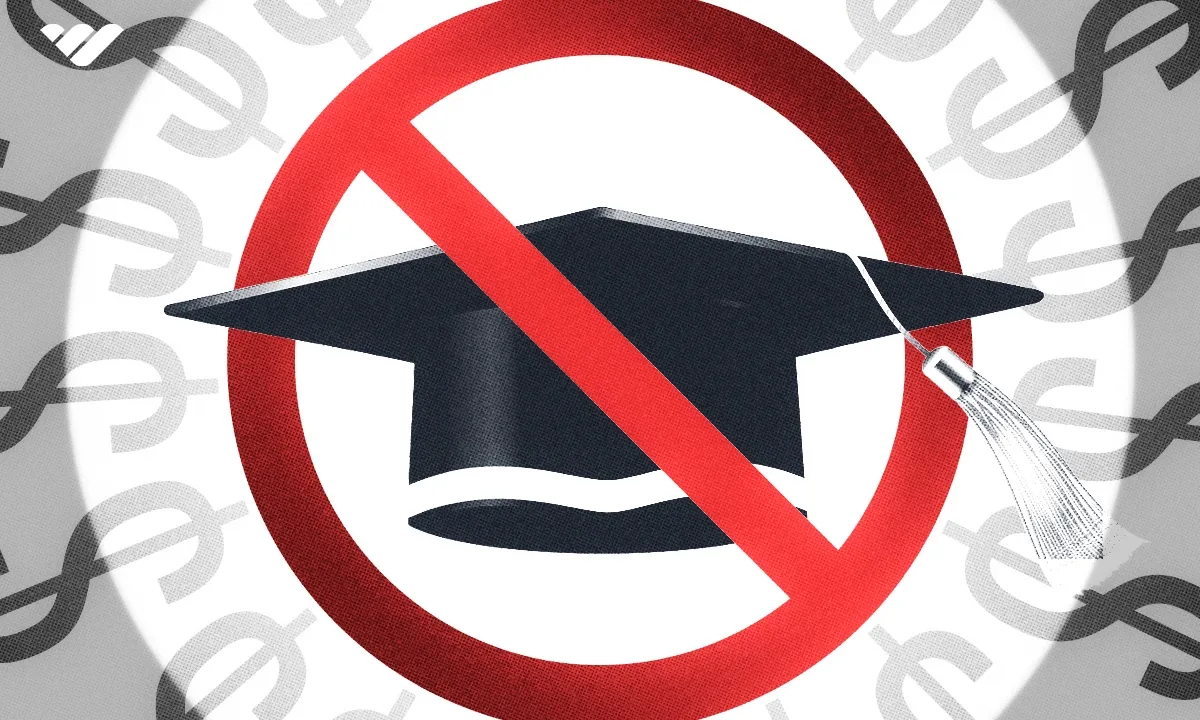Business degrees are often hailed as a must-have for any future business owner - but do you really need one? Read this guide to find out the truth about business degrees.
Key takeaways
- A business degree is not required for entrepreneurial success—skills, grit, and real-world experience often matter more.
- Online courses, mentorship, and hands-on experience offer affordable, practical alternatives to expensive formal business education.
- Problem-solving, resilience, and adaptability developed through doing outweigh academic qualifications for building a business.
I don’t have a business degree.
There, I said it. I don’t have a business degree and I’ve built a thriving business that generates six figures a year. My degree is actually in the arts (I can still hear my dad laughing now), and while I loved analyzing 20th-century paintings and designing my own book covers, it did not teach me an iota of business acumen.
In fact, 18-year-old me couldn’t think of anything worse than doing a business degree.
But here’s what I’ve learned: when it comes to starting and growing a business, the skills you develop and the experiences you have often matter more than what’s on your diploma.
And I’m not alone in this.
Some of the most successful entrepreneurs in history didn’t earn a degree at all. Richard Branson left school at 16 and built Virgin into a global empire. Sara Blakely, the founder of Spanx, didn’t study business - she worked as a door-to-door fax machine salesperson before creating her billion-dollar brand.
Mark Zuckerberg, Steve Jobs, and even Walt Disney—all icons in their fields—either skipped higher education or left it behind to focus on other things.
The lesson here is that while a business degree can be helpful, it’s definitely not the only route to entrepreneurial success.
The myth of the business degree
There’s a deeply ingrained belief that a business degree is the golden ticket to entrepreneurial success. The next best thing is a degree of any kind.
You’ve probably come across it too—the idea that, without formal education, you’re at a disadvantage. I definitely remember it being drummed into me throughout school and college. The only real path to success was through a higher education institution.
And this sentiment was reinforced by well-meaning parents and amplified by stories in the media. From such a young age, so many of us are taught that a degree is the only route to financial stability and career success. And sure, for some professions, that’s absolutely true (you 1000% need a degree to become a doctor or a lawyer).
But in the business world? It’s not so cut and dry.
This belief that higher education is a must-have can hold you back. It can make you feel lesser or that you’re not as well-equipped as someone who does have a business degree.
The reality is that plenty of successful entrepreneurs have proven this isn’t the case (see the non-exhaustive list above). Skills, grit, and experience often trump formal education when it comes to building something remarkable.
The (true) cost of a business degree
Business degrees—or degrees of any kind—aren’t cheap.
The average cost of a four-year degree in the US is about $100,000, but this number jumps dramatically if you want to study at a top business school.
Research shows it costs over $200,000 to get an elite MBA degree—more, if you’re eyeing one of the M7 or M7-adjacent B-schools.
In fact, the same study found that 19 of the 27 schools analyzed charge tuition fees and estimated living expenses exceeding $200k.
Living with student loan debt
Graduating with tens (or even hundreds) of thousands of dollars in debt can weigh heavily on your business decisions later.
I’m sure there are plenty of people who put off the idea of launching their business because they feel snowed under by student loans. You might feel pressured to take a safe job with a steady paycheck instead of pursuing your entrepreneurial dreams.
And if you do decide to bite the bullet and start a business, repaying loans while trying to build something new can be a massive strain.
Is the ROI worth it?
Because we’re talking business, it makes sense to discuss the ROI of a business degree. Of course, no one truly knows what kind of return it’ll give you because you can’t go back and undo a degree to see what difference it’d make.
But the question still remains: is the return on investment worth it?
Most of the studies out there highlight the ROI of a business degree based on students leaving and getting a “proper” job, not starting their own businesses. According to Statista, 92% of US businesses hire MBA talent (a percentage that’s actually on a downward trajectory).
When it comes down to it, though, the returns on a business degree are mostly intangible. Harvard Business School claims skills, connections, and earning potential are the biggest draw of a business degree.
It’s no wonder some entrepreneurs skip the degree entirely and use that money to launch their businesses instead. By investing in skills, tools, or even hiring help, they can make real progress without the financial burden of a degree.
While a business degree may offer a structured way to learn and connect, it’s not the only way to succeed. Ultimately, it’s worth considering whether the cost aligns with your goals.
From college dropout to successful business owner
Degrees are no longer the be-all, end-all.
According to Harvard Business Review, the number of US adults who consider a degree “very important” dropped from 74% to 41% in just six years. In fact, college enrollments in general are on the decline. The biggest fall was a 7% drop between 2019 and 2022, but the numbers still aren’t as high as they used to be.
So, what’s the alternative?
Many of Whop’s most successful digital creators don’t have degrees or are college dropouts. We’re definitely not saying you should drop out of college, but it’s becoming increasingly evident that you don’t need a college degree to succeed.
Take Alex Sedlak, a 24-year-old millionaire who’s built a massive business on Whop. He makes an average of $150,000 to $200,000 a month teaching others how to make money on TikTok with his Print Money W TikTok program.
Alex started out filming videos when he was 15 and sharing them online. He jumped on the TikTok trend when it first emerged and managed to make absolute bank doing something he loves.
And guess what? No degree in sight.
And then there’s Mino Lee, a 21-year-old who dropped out of college against his parents' wishes and now makes $20,000 a month teaching people how to make content for Instagram and TikTok with Content Academy Lite. This is recurring monthly revenue since he sells a membership through Whop that keeps people coming back month after month.
These are just two Whop creators who have done incredibly well without securing a business degree, but they’re definitely not the only ones. Plenty of creators have made $10,000+ a month without spending hundreds of thousands on a diploma (in fact, they’ve made hundreds of thousands instead).
How to start your own business without a degree
While no one plans to drop out of college when they start, it can and does happen. But if you’d rather avoid the whole college thing completely, there are other ways to succeed.
Find your passion and do it over and over again
The best way to get good at something is to do it repeatedly.
That might be designing, writing, coding, or selling. Whatever your passion, practice makes perfect (and builds confidence).
And here’s the thing: passion-driven consistency is often more impactful than theory-based education because you’re learning by doing, failing, and improving in real time. Plus, you’re doing something you love, which makes it far easier to wake up and crack on every day.
This is precisely how Alex Sedlak caught his business break. By filming videos and posting them again and again, he built an audience that he could then monetize into a million-dollar business.
Bear in mind that success doesn’t usually happen overnight. Most successful business people without a degree have spent years honing their craft, selling themselves, and learning from failures.
Take online courses and certifications
If you want some kind of qualification but can’t stomach the thought of spending four years at college, you can always take an online course.
Platforms like Whop, Coursera, and Udemy all offer a wide range of business courses, from marketing to financial planning, most of which are created by industry experts—a.k.a. people who have been there and done it before.
Most importantly, these courses are far more affordable than a full-on business degree and they’re also very specific. You can pick exactly what you need to learn right now instead of following a rigid curriculum. Some even offer certifications that look great on a LinkedIn profile or resume.
Lean into mentorship and networking
If courses aren’t your thing at all, regardless of what shape or form they come in, you can try finding a mentor or connecting with experienced entrepreneurs.
Mentors offer insights you won’t find in textbooks, like how to navigate real business challenges, avoid common pitfalls, and seize opportunities with both hands.
You can also take advantage of online and offline networking opportunities. This can lead you to fellow entrepreneurs who are either in the same boat as you or who have been there and got the t-shirt (in which case, can teach you a thing or two over a coffee). Hot tip: Whop is home to thousands of online communities where successful entrepreneurs share their advice with the next generation of business owners.
Building relationships as early as possible can open doors to collaborations, partnerships, and new ideas later down the line. Never underestimate the power of a network—something a business degree can give you, but it’s not always guaranteed.
Dive into books and podcasts
Books, podcasts, and blogs by fellow entrepreneurs can offer a wealth of insight. Most importantly, they’re accessible, affordable, and packed with real-world advice from business people who’ve walked the walk.
Want to learn about marketing? Pick up This is Marketing by Seth Godin. Need inspiration? Listen to How I Built This with Guy Raz.
The best part is you can tailor your education to your interests and goals—just curate your reading and listening list to match your needs. Check out this list of the best business podcasts for inspiration.
Get work experience and internships
There’s really no substitute for hands-on experience.
Sitting in a classroom reading a textbook about business doesn’t quite arm you with the real-life skills you need to navigate negotiations or get funding.
But you don’t have to dive in headfirst either.
Working in a small business or startup gives you a front-row seat to how things run. You can see what works, what doesn’t, and why. Getting up close and personal with successful businesses from the inside can teach you the practical skills you need to build your own business later.
Key skills for entrepreneurs (with or without a degree)
The skills I’ve learned over the past 10 years in business were nowhere to be seen in my university classroom back in 2010. Granted, I did an arts degree, but there’s still something to be said for learning on the job because, ultimately, there’s only so much you can know before you actually Do The Thing.
And in reality, the skills that truly matter in entrepreneurship aren’t taught in a classroom. They’re developed through experience. When you’re in the thick of it and ideating products, hiring staff, and deducting business expenses, practical skills often outweigh academic qualifications.
What are the key skills you need to succeed in business?
- Problem-solving. You’ll constantly encounter obstacles (trust me), whether it’s finding your first customer, managing cash flow, or writing a business plan. What sets great entrepreneurs apart is their ability to see problems as opportunities and figure out creative solutions.
- Resilience. Entrepreneurship is a rollercoaster and setbacks are just a part of the ride. The ability to bounce back from failures, learn from them, and keep going is what sets you up for long-term success.
- Adaptability. Business landscapes change quickly and being flexible enough to pivot or embrace new opportunities can mean the difference between succeeding and… not.
- Leadership. I’m talking about more than managing a team here. I’m also talking about leading yourself. Decision-making and research are essential here. You’re going to have to make tough calls (often without perfect information) and trust your ability to gather the insights you need to make the next step.
The case for a degree (for some)
As we’ve clearly laid out here, you don’t need a business degree to start a business. But there are cases where having a degree can be helpful or even essential. If your business idea falls into a highly regulated industry, like finance, law, or medicine, formal education might be a non-negotiable.
These fields often require specific qualifications, certifications, and licenses to operate legally and effectively.
Even outside of those industries, a degree can still give you some benefits.
One of the biggest is the opportunity to network. Colleges and universities are full of ambitious people who may go on to become highly successful business owners themselves. They might be future collaborators, investors, or advisors. After all, it’s not always what you know—it often comes down to who you know.
Some schools also offer access to alumni networks, business incubators, and mentorship programs that are great for building valuable connections early on.
There’s also credibility to consider here. For certain clients, investors, or partners, having a degree can signal a level of expertise or commitment. Sure, it’s not always a deciding factor, but it can give you an edge in situations where traditional credentials are valued.
Finally, a degree provides a structured learning environment. Not everyone is good at kicking out on their own or sticking to a routine of their own making. If you thrive with guidance and deadlines, formal education can help you build a solid foundation in areas like marketing, accounting, and management.
It’s definitely not the only way to learn these skills, but for some people, it’s the most effective.
So, while a degree isn’t a necessity for every entrepreneur, it’s worth considering if it’ll benefit your industry, goals, and learning style. Just make sure it’s a choice that serves you and your vision, not something you do because you think you have to.
So, can you start a business without a degree?
At the end of the day, what matters most isn’t whether you have a business degree. It’s your passion, persistence, and mindset. These are the traits that keep you moving forward, even when things get tough (and believe me, things will get tough). They push you to learn, adapt, and find solutions, regardless of any obstacles that get thrown your way.
And yes, a business degree can offer amazing benefits, like networking opportunities, introductions to the right people, and exposure to tools and frameworks that can help you succeed.
But you don’t need a degree to get those same advantages. Platforms like Whop make it possible to connect with mentors, join vibrant entrepreneurial communities, and access tools and resources without sinking hundreds of thousands of dollars into formal education.
I’ve come to realize that success in business is about what you do with what you have. It’s about taking action, building relationships, and staying curious. Whether you choose to learn through experience, online courses, mentorship, or platforms like Whop, the most important thing is you’re taking steps toward your end goal.
A degree might be the right choice for some people, but it’s not the only path to success.
Thinking about starting a business? Create a Whop today to sell online courses, community access, webinars, coaching services, masterminds, and other digital products and services.
Want to learn about business? Join Whop’s business communities for networking and advice.
FAQs
What degree do you need to start a business?
If you are launching a business in any medical, financial, or legal industry then you will need a relevant accredited degree. However you do not necessarily need a degree to start a business - it all depends on the industry you are operating in.
What can you do with a business degree?
There are many paths that you can take, including management, human resources, accounting, marketing, consulting, and even entrepreneurship. The path you take will depend on your chosen majors.
Can you be a CEO without a business degree?
Absolutely - there are many CEOs without business degrees (or any degrees) including Richard Branson (Virgin Group), Michael Dell (Dell Technologies), Travis Kalanick (Uber), Jan Koum (WhatsApp), Daniel Ek (Spotify), and many more.



